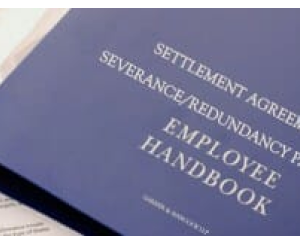All Your Questions Answered

Why are my employers asking me to sign a settlement agreement also known as a compromise agreement?
Settlement Agreements, also known as compromise agreements are protecting the employer. Also providing transparency in any redundancy situation or severance package. You are agreeing not to pursue any claim you may have against your employers in either a court or an employment tribunal.
Compromise agreements are recognised by statute and are the only way a claim can be validly resolved without tribunal proceedings having been initiated.
Usually time is tight when you require good advice, we offer expertise that you can access easily.
Request for a Legal Consultation
Garner & Hancock realise that the prospect of pursuing a legal matter can be challenging, so we offer an initial phone consultation to discuss your options, and to give you information that will help you make the right choices affecting your case.
Again, it is to protect the Employers. An independent solicitor will give more protection to the employer as it becomes binding.
The solicitor giving the advice must also sign the agreement and certify that the appropriate advice has been given. One of the conditions under the compromise agreement is that the Solicitor needs to be insured to give advice. All solicitors are covered by an indemnity insurance covering any negligent advice. But check their note paper – it will say “regulated by the Solicitors Regulation Authority”.
Usually, we keep to those fees paid by your employer. Remember, you are our client although your employer will be making the payment. The bill is therefore in your name but “payable” by your employers. We shall obtain payment directly from your employers so there is one less thing to worry about. If we are undertaking additional work for you then we shall agree on this with you in advance.
You have probably already negotiated a settlement figure directly with your employers. This is one part of many other issues which could crop up and which you had not thought about. The experienced solicitor will be able to explain the compromise agreement which can be written in a very legalistic language and can refer to sections of Acts and Regulations that you may never have heard of. You might also not have realised about issues like tax, pensions, benefits, and the possibility of negotiating an increase in your settlement figure.
It is also a legal requirement that your advisor signs the agreement to confirm that advice has been given. The advisor will have to make sure that he has got all the pertinent information to be able to advise you properly.
Your occupational pension will simply be frozen. But we suggest you speak to your employers pension provider about, transferring the pension, or continuing to pay in via another employer.
Once settlement agreements have been signed by all parties, any agreed compensation will usually be paid within 7 or 14 days. Sometimes, it goes through in the next company pay run. The payment date will be specified in the agreement.
You should also register for benefits, even if you are not entitled to them, because your national insurance will then be paid by the government. You should check any insurance policies which may kick in due to your unemployment.
No, if the compensation package is less than £30,000. But you do have to pay tax on, notice in lieu, holiday pay, bonuses, perks etc. You should also keep your compromise agreement safe in case the tax man asks about what these payments are for. You will be asked to give an indemnity but in most cases, as long the compensation is correctly calculated and it is pure compensation rather than, for example, notice in lieu or other taxable benefits then it is very unlikely that the tax man will go behind any compromise agreements. So the indemnity is just an extra protection for the employer and should be too onerous for you.
If the agreement is agreeable to you and there are no amendments and the advice is understood by you and you do not need time to read over the letter of advice confirming your meeting, we could have it executed in some cases there and then. But sometimes, the employers would prefer to have the solicitor name inserted in the agreement.
This can be done by email and even sent to you for final approval in this way. Some settlement agreements need to have it witnessed others do not and may even look like letters rather than agreements. Most will have an “advisors certificate” which is where the solicitor has the certificate on their headed paper, signed and dated, other types of certificates only require the solicitors signature, date, and stamp.
Full and Final? Compromise agreements will state the full breakdown of the payments you are receiving and the extent to which the sums will be paid free of tax.
Tax free or not? Usually, up to £30,000 compensation can be paid without deduction, but you will have to give a tax indemnity to your employer within the agreement. This is entirely usual.
Keep it hushed. The compromise agreement will also provide for confidentiality both in terms of your employers trade secrets and business affairs and also of the terms of the agreement. You will be paid a small additional sum for agreeing to this-usually a few hundred pounds.
Don’t talk bad about us? You will also usually be required not to make any derogatory comments against your employer. Some employees prefer such agreements to be mutual, and employers are often receptive to that.
Am I free to work anywhere?
Compromise agreements may confirm the existing post-termination restrictive covenants that you are already bound by under your contract of employment. In some cases, the covenants are new, having appeared in the compromise agreement for the first time. In either case, you need to take specific advice on this as your ability to work for a competitor and/or service old clients and customers could be hampered after you leave.
What does the list of Acts of Parliament mean?
There will be a long list of statutes in the compromise agreement (such as the Race Discrimination Act, Sex Discrimination Act, Employment Rights Act) and many more, under which you will agree not to bring a claim. You should not be concerned by this. As the compromise agreement is intended to be in full and final settlement of all claims the employer needs to list these to be able to enforce the agreement.
Reference, why so basic?
Most employers will attach a reference to the actual compromise agreement. Some will only give basic information such as when you started, your position, days off sick, and when you left. The reason for this is consistency with all other employers or to avoid a situation where something is said which could be detrimental to you and expose the employers to being sued. So most employers will play it safe and provide a basic reference. But you can ask for other information to be included including the reason for termination, promotions, successes in projects, and bonuses received.
Come and speak to us first for free. You can read more information on the ACAS site. Click here for the Booklet >>
This Guidance has been produced by Vinay Tanna, a partner at Garner & Hancock Solicitors. Garner & Hancock Solicitors is an established firm in west London and southwest London. We are covering the area of Richmond to Brentford and Hounslow to Chiswick. Garner & Hancock is a member of the Employment Lawyers Association and are experienced Employment Law experts.
The information contained on this site are copyright. However if you wish to reproduce this, it must be done in full. If you wish to refer to parts of it then as long as you provide the link to our website , you do not require permission, otherwise than these circumstances permission must be sought in advance.
We must also give a general disclaimer that the advice given is generic and the law is correct as at November 2108. You should not rely on this advice to your specific situation as it always best to seek professional help to help you through the law and its application to your case.
© Garner & Hancock Solicitors
Our Settlement Agreement Solicitor
How Can We Help?
We are here to help! Feel free to contact us anytime for a consultation on your legal matters.

